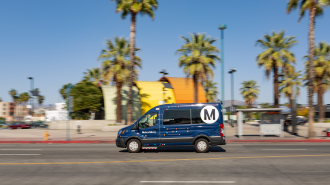Los Angeles has launched Metro Micro, a new on-demand public transportation service that will pick you up and take you on short trips within its service areas for just $1 a ride — making it cheaper than the bus but nearly as convenient as Lyft or Uber.
The challenge: Opting to ride the bus, train, or subway is typically cheaper and better for the environment than driving somewhere in a car, and it also frees you from the stress of navigating traffic and paying close attention to directions.
To enjoy those benefits, though, you need to be willing to adjust your schedule to the service’s timetable. You also need to be okay with making your journey with dozens or even hundreds of other (sometimes dangerous) people.
An Uber or Lyft will free you from the headache of dealing with traffic and other passengers, but you’ll also need to trust that your driver is keeping their vehicle in safe condition and likely pay far more for a ride than you would if you took public transportation.
“Our goal with Metro Micro is to offer a more flexible, convenient service for riders.”
Brian Haas
The idea: In December 2020, Los Angeles — a city notorious for its traffic and reliance on cars — launched a pilot program for a new service that makes taking public transportation for short trips both more convenient and less risky.
It’s called “Metro Micro,” and it consists of a fleet of vans that ferry riders between hundreds of pick-up and drop-off spots within each service zone on-demand. Rides can be booked via phone, app, or web up to 7 days in advance, and each trip costs just $1, regardless of the distance.
Vans can hold up to 10 passengers, so your ride might include a detour to pick up or drop off someone else. However, drivers are screened LA Metro employees who have received safety training, and not independent contractors hustling to break even by the end of a shift.
“Really, our goal with Metro Micro is to offer a more flexible, convenient service for riders in these zones for short trips to replace driving alone — particularly in areas where bus or rail routes are less frequent,” Brian Haas, a communications manager with LA Metro, told the Eastsider in 2021.
The big picture: Metro Micro does have its limitations. Rides can only be booked during service hours, which are limited to somewhere between 5 AM and 11 PM, depending on the location, and while the service covers eight zones, much of the city lies outside of them, and vans won’t transport riders from one zone into another.
The $1 price tag is also an “introductory price,” and Rani Narula-Woods, senior director of special projects with LA Metro, recently told the Next City Podcast that the fare will likely be reassessed at the end of the project’s three-year pilot phase.
That’s when the city will need to decide whether or not to continue the program, but if it doesn’t, it won’t be for lack of demand — in September 2022, Metro Micro was delivering 2,500 trips daily, but receiving requests for 14,000, according to Narula-Woods, and in the first quarter of 2023, it’s on track to provide more than a million rides.
If the project is extended, the city will likely need to expand its fleet dramatically to meet demand. If it doesn’t, wannabe riders will want to be sure to book trips well in advance or have a backup plan in place in case a van isn’t available.
We’d love to hear from you! If you have a comment about this article or if you have a tip for a future Freethink story, please email us at tips@freethink.com.
